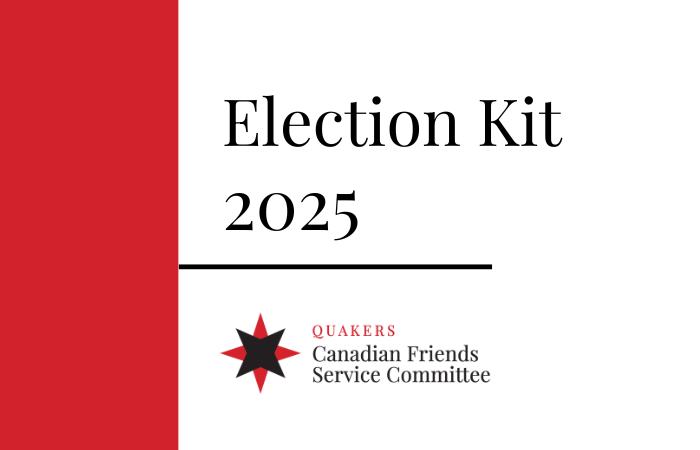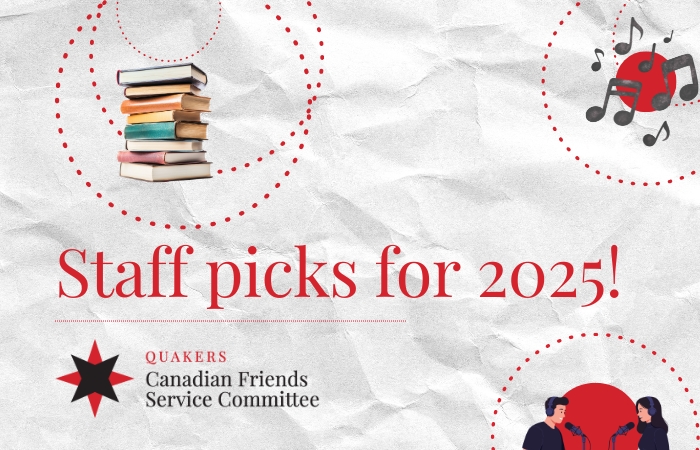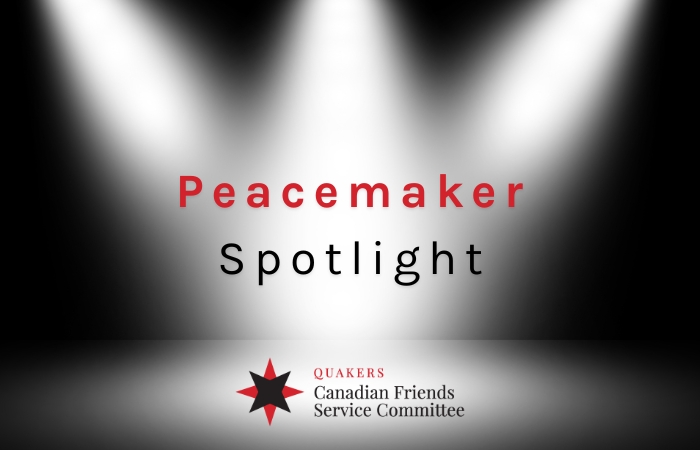
You’re not just you: how others shape your true self
March 3, 2025
Canadian Friends Service Committee (Quakers’) statement on US-Canada trade war
April 2, 2025
A federal election has been called for April 28th. This kit by Canadian Friends Service Committee—the national peace and social justice agency of Quakers in Canada—is here to help you ask candidates informed questions about the issues we work on.
Peace
Military spending
Amidst the ongoing trade war that the US has initiated with Canada, there is a real push to drastically increase military spending. Canada has been critiqued by some about its allegedly low military spending (the 2% of GDP expectation). However, Canada is seventh in NATO and 16th in the world in terms of military spending, and this comes in a context where global military spending has reached an all time high of $2.4 trillion annually. Despite these major spending increases, Canada has not improved its capacities of diplomacy or peacebuilding, and globally peace is only declining.
Canada has proudly stated that it recognizes the need to address the drivers of conflict and the root causes of poverty to address humanitarian strife. In 2022 while Canada provided $14 billion in sustainable development assistance, $26 billion was spent on the Department of National Defence. A way to respond to criticisms regarding NATO spending targets would be to utilize NATO’s own definition of eligible spending, which includes:
“Expenditure for peacekeeping and humanitarian operations, paid by the Ministry of Defence or other ministries, the destruction of weapons, equipment and ammunition, and the costs associated with inspection and control of equipment destruction are included in defence expenditure.”
Canada’s updated policy released last year, Our North, Strong and Free, adds to the promised $73 billion increase in military spending over the next 20 years with an additional $8.1 billion over the next five years. And it is likely that these numbers are conservative given the general unease being caused by US rhetoric about annexation.
However, this very situation has created an opportunity. There is now a growing call to cancel the planned purchase of F-35 fighter jets from US-based company Lockheed Martin.[1] With a lifespan cost of almost $74 billion,[2] these stealth fighter jets are not designed for defence, but rather to strike. If we are talking about Canada’s defence and security, then investing in people in Canada would produce better results.
Questions:
- Will you commit to increasing international development and humanitarian assistance and leverage those dollars to meet Canada’s NATO contribution, drawing on Canada’s previous global reputation for peace and diplomacy?
- Will you commit to ending the contract for the F-35 fighter jets and instead invest these billions into supporting Canadians during the economic hardship that the US trade war and tariffs will cause?
Global affairs and international law
In this time of heightened global tensions, Canada needs to redouble its efforts on strengthening global norms, global diplomacy, and championing responsible crafting and use of security policy.
Paramount to this is standing up and using our diplomatic tools to consistently support bodies to which we are members, including the International Criminal Court, the International Court of Justice, and the United Nations and all treaties, conventions, and agreements that we have adopted and ratified.
Canadians want Canada to be a peace leader on the international stage, especially in these anxious times. Canada must not maintain the status quo that continues to ratchet up violent conflict. It must find innovative ways to meet this moment head on through responsible and innovative security policy.
Introducing a peace lens into policy making, like the specialized Gender-Based Analysis Plus (GBA+)[3] lens, could ensure that policy isn’t created in a vacuum. A peace lens could balance the security, humanitarian, and peacebuilding needs that lie at the roots of violence, while also prioritizing the prevention of armed conflict, thereby making us all safer.
Questions:
- Are nonviolent strategies for addressing conflict adequately emphasized and resourced within Canada? What would you change?
- What is your position on the establishment of a peace lens within government?
- Will you commit to increasing development and humanitarian assistance and leverage those dollars as meeting Canada’s NATO contribution—drawing on Canada’s previous global reputation for peace and diplomacy?
- Canadian arms exports continued in 2024 to Israel and Saudi Arabia despite documented risks of their misuse. This is directly counter to domestic and international legal requirements under the Arms Trade Treaty (ATT). How would you or your government ensure that Canada is brought into compliance with obligations under treaties and conventions it has ratified?
*If you are interested in asking questions regarding Israel/Palestine, CFSC recommends looking at VotePalestine.ca, an elections resource endorsed by CFSC and put together by Canadian faith, human rights, and social justice groups working on Palestine/Israel issues.
Canadian human rights
In Canada we enjoy human rights protections that are enshrined in The Canadian Human Rights Act of 1977 and The Canadian Charter of Rights and Freedoms of 1982. As an electoral democracy, Canadians largely believe in the institutions that exist to protect their civil liberties and freedom of expression. Erosion of civil liberties and fundamental human rights is occurring and accelerating globally. Autocracies have now surpassed democracies (91 vs 88).[4] Respect for independent institutions, the rule of law, and a robust civil society can hold governments accountable.
Questions:
- Given the overt reduction of civil liberties in the US currently, how will you protect the rights of women and 2SLGBTQ+ Canadians?
- How will you protect newcomers’ abilities to universally self-determine healthcare, education, and employment needs?
- How will you address both the rise of anti-Palestinian racism and antisemitism fairly?[5]
- How will you address the criminalization of people participating in peaceful protests and nonviolent actions on issues of conscience?
Peace education and local peace initiatives
With the increase of affective polarization seen both in our media and in our politics, there is a need for increased communication skills across party lines. Canadians need our various government parties to collaborate effectively, but also to have meaningful and constructive disagreements. This would require our MPs to possess stronger conflict resolution and compassionate communication skills.
Pilot programs such as the Mindfulness Initiative[6] in the United Kingdom have proven that when MPs have access to this training, it makes a significant difference in the ways they engage with their communities and colleagues. In Canada there is a disconnect between MPs and the electorate that such training could help rebuild.
Questions:
- Will you invest in the depolarization of our politicians by promoting compassionate communication skills training?
- How could you invest local-level funding for peacebuilding initiatives, such as peace education, interfaith projects, and projects that address economic inequality?
![]()
Indigenous Peoples’ human rights
UN Declaration on the Rights of Indigenous Peoples
After passing the United Nations Declaration on the Rights of Indigenous Peoples Act, the government released a National Action Plan aimed at the full implementation of the Declaration in Canada. This plan included several specific action items including the creation of a monitoring mechanism where Indigenous Peoples can bring forward cases of infringement to be remedied.
Question: If elected, what steps would you and your government take to establish and fund an independent Indigenous rights monitoring, oversight, recourse, or remedy mechanism in consultation and cooperation with Indigenous Peoples (Shared Priorities Action Item 19)?
Special Interlocutor report
The Office of the Independent Special Interlocutor for Missing Children and Unmarked Graves and Burial Sites associated with Indian Residential Schools released their final report in October 2024. Rather than make recommendations, the report identified several legal, moral, and ethical obligations, many of which were directed at the federal government.
Question: If elected, how would you and your government take meaningful steps to act on these obligations in accordance with the UN Declaration on the Rights of Indigenous Peoples, Indigenous law, and international human rights and criminal law?
Tariffs, negotiations, and Indigenous Peoples
The UN Declaration on the Rights of Indigenous Peoples recognizes Indigenous Peoples’ inherent right to self-determination. Self-determination includes the right to negotiate trade and protects against the imposition of tariffs without free, prior, and informed consent.
Question: How would you and your government ensure the protection of Indigenous Peoples’ right to self-determination in trade negotiations and protect against the imposition of tariffs without free, prior, and informed consent?
Missing and murdered Indigenous women and girls
We are currently in the sixth year since the Final Report of the National Inquiry into Missing and Murdered Indigenous Women and Girls, which included several Calls to Justice. The Assembly of First Nations’ recently issued a report urging significant and substantive action to fulfill these calls.
Question: What concrete means would you and your government use to achieve the full implementation of the Calls to Justice and which calls would you prioritize?
Truth and Reconciliation Commission Calls to Action
This year marks the tenth anniversary of the Truth and Reconciliation Commissions’ Final Report. This report included 94 Calls to Action, many of which call upon the government to act on reconciliation.
Question: Given the lack of progress on implementation, how will your government prioritize fulfilling the 94 Calls to Action, in consultation and cooperation with Indigenous Peoples?
Transformative justice
Quakers have a concern for “that of God in everyone,” which includes incarcerated and formerly incarcerated people and everyone impacted by their actions. In 1981, Canadian Quakers came to a collective position that we were, “turning our efforts to reform prisons to efforts to replace them with non-punitive, life-affirming and reconciling responses.” This work includes advocating for transformative justice (as opposed to the current punitive and adversarial model), amplifying voices of lived experience, and exploring ways to address the root causes of harm in our communities.
Public safety
Members of Parliament make laws that profoundly impact individuals and communities, especially with regard to criminal justice. In this election, there are already calls for greater “tough on crime” policies that have proven to be ineffective for public safety. In fact, it is important to note that “tough on crime” policies implemented in the past have been struck down by the Supreme Court and by various provinces and territories at extraordinary cost to the public purse.[7] The same measures should not be revisited when there are existing policies and alternatives that prove more effective for public and community safety.
Questions:
- Will you consult with currently or formerly incarcerated constituents and their families about their experiences with our criminal justice system? Would your actions as a lawmaker include their perspectives?
- There are community services and programs that effectively decrease the rate of reoffending or returning to being incarcerated. How will you provide greater funds and support for these programs, as stipulated in the Federal Framework to Reduce Recidivism (a bill that passed with support from all parties)?
Racism in the criminal justice system
People in Canada are incarcerated at unequal rates. According to Justice Canada, 9% of people incarcerated federally in Canada are Black, and 33% are Indigenous. Black people make up 4% of Canada’s population, and Indigenous Peoples are 5%. The statistics for incarcerated women are even more alarming, with Indigenous women making up almost 50% of incarcerated women.
Question: What would your government do to address the conditions in both the Canadian legal system and broader society that lead to these disturbing statistics?
Use of Healing Lodges
Call to Action 31 of the Truth and Reconciliation Commission’s Final Report calls on Canadian governments to “…provide realistic alternatives to imprisonment for Aboriginal offenders and respond to the underlying causes of offending,” such as Healing Lodges.
Question: The Lodges that exist have proven to be highly effective, but Correctional Services of Canada has been reluctant to send people to them, so they are significantly underutilized. If you and your government were to be elected, what would you propose to do to fix this problem?
Diversion of spending from criminal justice to restorative justice
Renowned Ottawa criminologist and victim’s rights advocate Irvin Waller’s work shows that even a 5–10% reduction in spending on the carceral system would—if invested in preventative programming instead—result in a reduction of up to 50% in violent crime.
Question: What will you and your government do to increase preventative spending (on community supports, recreation programs for youth, addiction and mental health supports, etc.) and make our communities safer?
Victims’ Bill of Rights
As Quakers we are glad that Canada has a Victims’ Bill of Rights, and that the Bill includes the victim’s right to request a restorative justice approach. What the Bill lacks, however, is assurance that victims will be given information about restorative justice. This means that people who aren’t aware of restorative justice as an option may not be able to access it even if it might be their preferred approach.
Question: What will your government do to include an additional clause in the Victims’ Bill of Rights such as “Victims must be informed about Restorative Justice, and their right to choose a Restorative approach?”
Guaranteed Livable Basic Income
CFSC is advocating for a Guaranteed Livable Basic Income (GLBI) to help ensure that people are able to live with dignity. GLBI is an income-tested program that would ensure people do not fall below a certain economic threshold.
With inequality, cost of living, and poverty rising at alarming rates, the 2025 federal election provides an opportunity to see where candidates and political parties stand on this urgent policy issue. With the increased pressures of the tariffs, the trade war, and looming job loses, income security for people in Canada should be of utmost importance in this election.
The various political platforms have released information on tax cuts, service cuts, spending increases, and proposed government size. There is an outlook that forecasts fiscal austerity. With austerity comes the likely shrinking of the social safety net, allowing more people to fall into insecurity. Shoring up people’s economic security and wellbeing should be a priority for all party candidates.
Questions:
Last year Oxfam Canada released its Inequality Inc. report,[8] which found that the richest 0.02% of Canadians had more wealth than the bottom 80%. How would you or your party propose to reduce the growing wealth disparity that StatsCan reports as the highest ever-recorded in Canada?
In this context, would you and your party support a Guaranteed Livable Basic Income as a strategy to mitigate the wealth disparity and provide income security to people fearing a slide into poverty?
Peace
While not a long-lived project, the Ontario Basic Income Pilot (OBIP) was able to contribute to the growing body of evidence showing the positive benefits that cash transfer programs, such as basic income, offer participants. Such programs alleviate psychological distress and improve mental health and wellbeing for people living in poverty.
Having the OBIP prematurely cancelled could therefore be seen as a form of structural violence[9]—suffering imposed on people in society that is avoidable and can be remedied through policy actions. People in the OBIP had their lives thrown back into chaos and in most cases, the advancements made in secure housing, upskilling, and education had to be abandoned.
Question: 1 in 10 people in Canada are living in poverty now, and that number is poised to increase. What policy proposals would you and your party propose to eradicate poverty and how would you work in consultation with civil society to ensure the policies are practical and effective?
Indigenous Peoples’ human rights
There is a significant poverty gap between Indigenous and non-Indigenous people in Canada. This gap especially impacts Indigenous women, girls, two spirit, and LGBTQ+ people. Call to Justice 4.5 of the Final Report of the National Inquiry into Missing and Murdered Indigenous Women and Girls is for the government to establish a Guaranteed Livable Basic Income for all people in Canada.
Question: If elected, what would you and your party do to close the poverty gap between Indigenous and non-Indigenous people, and Indigenous and non-Indigenous communities? Will this include the establishment of a GLBI as called for in Call to Justice 4.5?
Transformative justice
A GLBI would reduce incarceration rates in Canada by reducing crimes of poverty, and would reduce recidivism by providing sufficient support to people who have been released from jails and prisons. Bill C-223 on implementing a GLBI was voted down in the House (and Bill S-223 was halted in the Senate due to proroguement).
Question: What would you and your government do to bring back this important bill and ensure its passage?
Additional resources
You may be interested in these additional election kits:
Information on how to vote in the Federal Election if you are homeless can be found here: https://www.endhomelessnessottawa.ca/vote_canada_federal_election_homeless
Notes
[1] Murray Brewster, “Canada reconsidering F-35 purchase amid tensions with Washington, says minister,” CBC, March 16, 2025.
[2] Albert Kho et al., “The Life Cycle Cost of Canada’s F-35 Program: A Fiscal Analysis,” Parliamentary Budget Office, November 2, 2023.
[3] Government of Canada, “Gender-based Analysis Plus (GBA Plus),” https://www.canada.ca/en/women-gender-equality/gender-based-analysis-plus.html
[4] Varieties of Democracy, “Democracy Report 2025,” https://www.v-dem.net
[5] CFSC has supported the use of the Jerusalem Declaration definition rather then the International Holocaust Remembrance Alliance (IHRA) working definition on antisemitism. In practice the IHRA definition is often used to consider legitimate criticisms of Israel and Israeli human rights violations against Palestinians as antisemitic. The flawed IHRA definition has resulted in speech suppression and often racist harassment campaigns particularly in the form of anti-Palestinian racism.
[6] See https://www.themindfulnessinitiative.org
[7] Ben Andrews, “Courts, government bills are unravelling Harper-era crime laws,” CBC, Nov, 2, 2022, https://www.cbc.ca/news/politics/stephen-harper-mandatory-minimum-sentences-criminal-code-1.6637154
[8] Oxfam Canada, “Inequality Inc: Oxfam’s call to address the widening wealth gap,” Jan 14, 2024, https://www.oxfam.ca/story/inequality-inc-oxfams-call-to-address-the-widening-wealth-gap/
[9] Tracy Smith-Carrier and Elaine Power, “Structural Violence and the Social Determinants of Mental Health: Exploring the Experiences of Participants on the Ontario Basic Income Pilot in Ontario, Canada,” Jan 3, 2025, https://onlinelibrary.wiley.com/doi/10.1155/hsc/7816069





